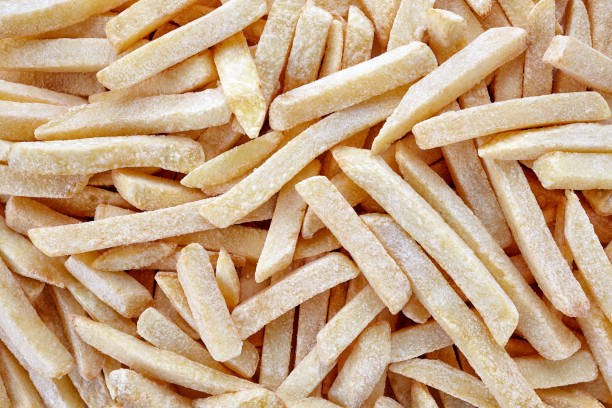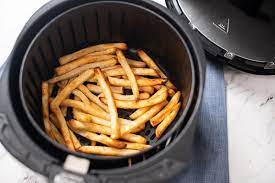What Is the Best Oil for Frying Frozen French Fries

Are you a huge admirer of frozen French fries? I understand. French fries are one of my favourite foods.
Nonetheless, I wouldn’t want to go to a restaurant every time I had a craving.
I want to start creating them at home in the manner I prefer. Many individuals, I believe, do not go to the trouble of slicing a potato for french fries. Learning how to make great diner-style fries at home is well worth the effort.
Almost everyone agrees that the best fries are smooth on the inside and golden and crisp on the outside. The most convenient option is to buy frozen fries from the grocery. Prepare a serving of fries for yourself or your family. This amazing flavour of crispness will make everyone delighted when paired with your favourite side dish. However, if you don’t cook it properly, you risk ruining the fries by making them overly soggy.
Remove the bag from the freezer whenever you need to prepare a dish and begin frying. I’m aware that not everyone in the family owns a deep fryer. So, using your all-time favourite: frozen french fries, I’ll give you a thorough lesson on creating the ideal french fries at home.
Frozen French Fries: What’s the Best Oil to Use?

Have you ever wondered which oil is ideal for frying frozen french fries?
A platter of hot, tasty french fries is enjoyed by many.
Keep reading to learn how to create the best french fries you’ve ever tasted.
The flavour and aroma of the fries should not be affected by the oil you use.
It must also be able to tolerate high temperatures.
This means that you’ll need to utilise oil with a high flashpoint.
It signifies that the oil does not begin to break down at a high enough temperature in a deep fryer.
It also shouldn’t produce a lot of smoke.
Olive oil, or anything unprocessed, has a low smoke point because it might burn before reaching the ideal temperature for a golden-ish colour.
“The smoke point limits the highest useful cooking temperature of cooking fats,” Harold McGee wrote. The smoke point of fat is the temperature at which it breaks down into visible gaseous products. The initial free fatty acid level of the fat determines its stability and smoke point. The lower the free fatty acid content, the more stable the fat is and the higher the smoke point.” “On Food and Cooking,” according to his book.
Use clarified butter instead of unsalted butter because it will release moisture, making your fries soggy. When frying, use a medium-high flame. Because deep fryers use a lot of oil, you may obtain oils at a significant discount if you want to. Because you’re likely to utilise your deep fryer for various foods, these oils will work well with almost anything you prepare.
These are some oils that would be better suited to the task:
- Canola oil
- Peanut oil
- Sunflower
- Corn oil
These oils produce smoke at a temperature of over 400 degrees Fahrenheit, which will not set off the smoke detector. These have a mild flavour to them as well. The flavour is also crucial to consider when choosing an oil because it can completely change food flavour.
For instance, the soybean imparts a stronger flavour to food. On the other hand, Canola oil transfers significantly less flavour, yet it has a unique aroma when fried. These factors contribute to making a difficult decision, so think it through thoroughly.
How Long Do Frozen French Fries Take to Fry?

The next question is, “I’m not sure how long I must fry those french fries/” Now that you know which oils to use, the next question is, “How long should I fry those french fries?”
To begin, heat the oil to 350 degrees for frying frozen french fries.
Fry for three to five minutes, or until the bacon is beautiful and crispy. It’s crucial to keep in mind that it shouldn’t be overlooked! When preparing frozen french fries, there’s no need to double-fry them.
Because most frozen fries are semi-cooked, you won’t have to spend a lot of time preparing them. To maintain a uniform appearance around the fries, keep an eye on them and turn them until they are a wonderful golden brown hue.
Using a slotted metal spoon, carefully remove the fries from the oil.
Place it on a tray that has been lined with absorbent papers.
Season with salt and pepper.
If you want to make your potato fries, follow these instructions. If you’re making fries from beginning to end, you’ll always want to fry them twice. After completing the preparations, you should initially fry at a reduced temperature.
Ensure that they are smooth but not brown. Using absorbent paper towels, drain the excess oil. After withdrawing the pan from the oil, increase the temperature to 375 degrees and cook for about four minutes.
How Should Frozen French Fries Be Prepared?
You might want to double-check that your fries don’t have large chunks of frozen food on them. As you drop the fries into the hot oil, this will splatter. You also don’t want to reheat your frozen fries until you’re ready to utilise your deep fryer.
Frozen until frying ensures that the fry is completely encased in the cooking process. Did you know that doing so results in a crispier fry? Most significantly, freezing your fries can result in excessive oil absorption and, as a result, mushier french fries.
What is an Air Fryer, precisely, and how does it work? Is it OK to use it to cook my frozen French fries?
An air fryer is something you’ve most likely heard of. It’s a fairly new device that uses extremely hot air circulation to fry dishes with little oil. Air fryers were first licensed in 2005. However, related equipment has been available since the late 1980s. These were created to look like quick frying but without the fat and calories of hot oil cooking.
Air fryers work by blowing warm air over items that have been sprayed or poured with a small amount of oil. The oil spreads when the air moves, giving everything a crunchy, crispy finish.
You don’t fry anything, but thanks to the constant flow of heated air, you may achieve a crispy surface by the same type of accelerated moisture removal that occurs in frying. There are a variety of models accessible on the market, each with its own set of processes.
It’s not the same as frying in a deep pot. However, it is an excellent method to enjoy crunchy cuisine while reducing calorie intake. In comparison to a deep fryer, it could always be cleaned up fast. It does not cause as much mess as a deep fryer.
The Benefits of Cooking with an Air Fryer

When utilised properly, air fryers offer certain nutritional benefits.
Increased consumption of fried meals is linked to higher levels of obesity. This is because deep-fried foods are high in fat and calories. A switch will aid weight loss from deep-fried to air-fried dishes, as well as a reduction in daily consumption of fatty oils.
When food is fried in oil, harmful substances such as acrylamide are produced. This chemical is found in foods cooked at high temperatures, such as deep-frying. Individuals can limit the chance of acrylamide in their food by switching to air frying.
Cooking in deep-frying oil necessitates a large container full of scalding hot oil. This could jeopardise security. There is no risk of leaking, splattering, or accidentally handling hot oil when heated air fryers. To maintain your health, you should operate frying equipment with caution and follow all instructions.
How can you make your oil last longer?
There will most likely be moments when there isn’t much frying going on in your house. Do not alter the oil to prepare heat during these idle intervals.
If you have an AutoFry fryer, you can use the standby key to turn off the heat and reduce the temperature to 300°. That’s heated enough to make reheating the oil to frying temperature straightforward and convenient, but also neat enough to extend the oil’s life.
Unnecessary Ice Formation Some Quick Frying Tips to Make Your Life Easier
I recommend frying frozen foods when possible, but you must remove any major or unneeded ice development from the frozen food before placing it in the heated oil. If you put the fries in when the ice is still on top, you’ll have a lot of trouble. In practice, if you use a completely open frying pan, you risk getting burnt fingertips.
Your Oil Should Be Filtered
Filtration of the oil is crucial in frying that is either never done or done very infrequently. Refining the oil reduces the oil’s lifetime and causes food to taste bad. But none of that is beneficial to you, so establish a daily cleaning oil practice. The key is to do it every day, no matter how you find the time. If you fry on a massive scale, you might as well do it several times a day.
Filtering oil should improve the quality of your oil while also keeping the meal smelling fantastic. When oil is unclean, it degrades at a significantly faster rate.
You’ll extend the life of your oil by keeping it clean, and you’ll save money by not having to buy new oil as often.
Cleanup once a week
You might be tempted to skip a more detailed weekly washing when you filter oil every day, but you shouldn’t. Daily maintenance measures and routine thorough cleaning are required if you want the oil to last long. This includes cleaning the oil container, replacing any used oil, and cleaning up any grime or smudge that has developed over the week.
The oil that has become contaminated should be replaced.
While doing your usual laundry, you should also start changing the oil. If the following conditions exist, the oil must be replaced:
Food that is burned or smells dry tends to appear or smell that way.
A burnt or faint blue haze appears to be emanating from the fryer.
Your meal’s finish has darkened or has burned markings on it.
Which Potatoes Should You Choose?
If you’re planning to create your french fries, potatoes with a greater starch content, such as Idaho or Russet potatoes, are perfect. Because this form of potato is denser, it has a lower moisture content.
Ignore waxy potatoes, which create french fries and have red skins. There’s a lot of water in these. As the water evaporates during cooking, they will finally hollow down.
Frozen French Fries: How to Make Crispy Fries
- One of the keys to excellent French fries is to keep them frozen until they’re ready to fry. The other thing to do is make sure the oil is hot enough.
- While preparing, use a medium-high flame.
- Make sure there aren’t too many fries in the pot because overcrowding the pan will result in less-than-ideal frying results.
- Seasoning them before or during the frying process is not recommended. If you’ve already seasoned them, the salt may absorb moisture that we don’t want, and the fries may stick to the bottom of the pot. You won’t be able to conserve the oil if you add salt to it during the frying process.
Conclusion
Finally, we addressed the question of which oil to use for cooking frozen french fries. It’s not as though all oils are the same.
Each oil has its flavour and flashpoint, which might impact your cooking.
This section gave you a thorough review of deep fryers and frozen french fries.
We also looked at how to make crispy frozen fries, the best oils for frying frozen fries, air fryers, and deep fry is frozen fried fries.











